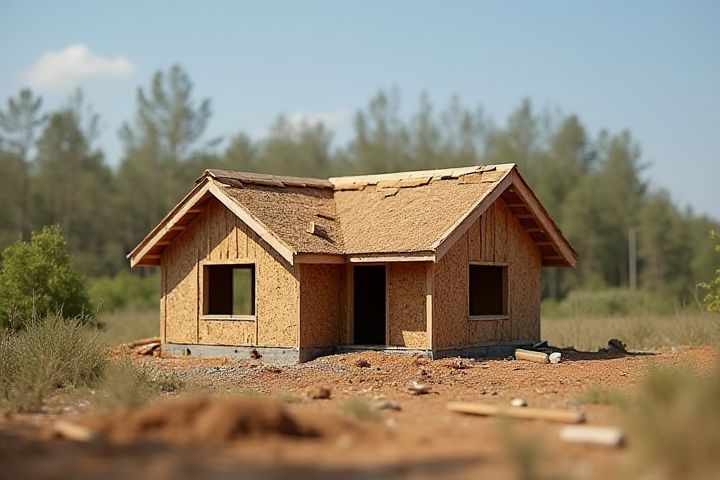
Building a house on leased land is indeed possible, depending on the terms of the lease agreement. Many leases allow for permanent structures, but others may impose restrictions or require the landlord's consent. It's crucial to thoroughly review the lease for any clauses regarding construction, as well as zoning regulations that could affect your plans. Additionally, financing options may vary, as lenders often have specific policies about homes on leased land. You should also consider the long-term implications, such as lease renewal terms and potential increases in lease payments.
Can You Build A House On Leased Land
Lease Duration
You can build a house on leased land, but the lease duration is crucial in determining the feasibility of your project. Many leases range from 30 to 99 years, offering varying levels of security and investment potential. A longer lease duration may allow for greater financial investment in construction, while a short-term lease could lead to uncertainty about the future of your residence. Always review the lease terms carefully to understand your rights and responsibilities before committing to building on leased land.
Land Use Restrictions
Building a house on leased land is often subject to specific land use restrictions outlined in the lease agreement. These restrictions can encompass zoning laws, building codes, and permissible land activities, which may dictate the type of structures you can develop. In urban areas, for example, zoning regulations could limit residential construction to certain sections, affecting what you can build and how. Understanding these land use restrictions is essential not only for compliance but also to avoid potential legal issues that can arise during the construction process.
Building Permits
Building a house on leased land requires navigating specific local regulations concerning building permits. Typically, the lease agreement must allow for permanent structures, which can vary by jurisdiction. Before initiating construction, you need to apply for a building permit, which usually involves submitting plans and demonstrating compliance with zoning laws and safety codes. Always consult with your local building department to understand the necessary documentation and procedures to avoid legal complications.
Financing Challenges
Building a house on leased land presents several financing challenges that you should consider carefully. Traditional mortgage lenders typically require ownership of the land for collateral, making it difficult to secure financing for construction on leased properties. Lease terms can influence financing options; most lenders prefer leases that are long-term, ideally 99 years, to ensure that the investment remains viable throughout the life of the loan. Furthermore, you may encounter higher interest rates and larger down payment requirements due to the perceived risk by lenders, which can significantly impact your overall budget and affordability.
Landowner Agreements
Building a house on leased land is entirely feasible, provided you have a clear and legally binding landowner agreement. This contract should outline the terms of the lease, including the duration, monthly rent, and any specific conditions related to construction. It's crucial to ensure that the agreement grants you the right to build, as some leases may restrict modifications or developments on the property. Engaging with a legal professional can help you navigate these complexities and ensure your investment is secure, protecting both your interests and those of the landowner.
Zoning Laws
Building a house on leased land is subject to specific zoning laws that can vary significantly by location. Most jurisdictions require compliance with local zoning regulations, which dictate land use, building height, and density. For example, residential zones typically have restrictions on the type of buildings permitted and may require approval for any construction. Before proceeding, you should consult with your local zoning office to ensure compliance and avoid potential legal issues.
Property Taxes
Building a house on leased land can lead to complex property tax implications. Generally, you may be responsible for paying property taxes on any improvements you make, such as the house itself, while the landowner remains liable for taxes on the land. Depending on the jurisdiction, property taxes on improvements typically range from 1% to 3% of the assessed value. Understanding local tax regulations is crucial to budgeting for potential expenses, ensuring you account for both lease payments and property taxes.
Improvement Ownership
Building a house on leased land is feasible, yet it presents unique challenges regarding improvement ownership. Typically, lease agreements stipulate the terms of ownership for any structures you erect, often designating them as the property of the landowner unless otherwise negotiated. You should thoroughly review lease terms, as some leases may allow for compensation when the lease expires or if the landowner sells the property. Understand that improvements may enhance the land's value, so it's crucial to clarify your rights concerning those enhancements to protect your investment.
Sublease Terms
Building a house on leased land is feasible if the sublease terms explicitly permit such construction. Often, the original leaseholder retains specific rights, so you should review the agreement to ensure modifications or improvements adhere to the conditions outlined, including obtaining necessary permits. You may encounter restrictions regarding the type of structure, duration of sublease, and responsibilities for maintenance and property taxes. Clarifying these elements in writing with your landlord is crucial for avoiding potential disputes and ensuring compliance with local zoning regulations.
Renewal Options
Building a house on leased land is a viable option, especially when considering renewal options that can significantly impact your long-term investment. Typically, land lease agreements last between 20 to 99 years, with renewal options allowing you to extend the lease for additional terms, often at predetermined rates. You should verify specific clauses in the contract, as they often define the conditions under which you can renew, including potential escalation in lease payments or modifications to property usage. Understanding these renewal options can safeguard your investment, ensuring that you maintain control and ownership of your property well into the future.
